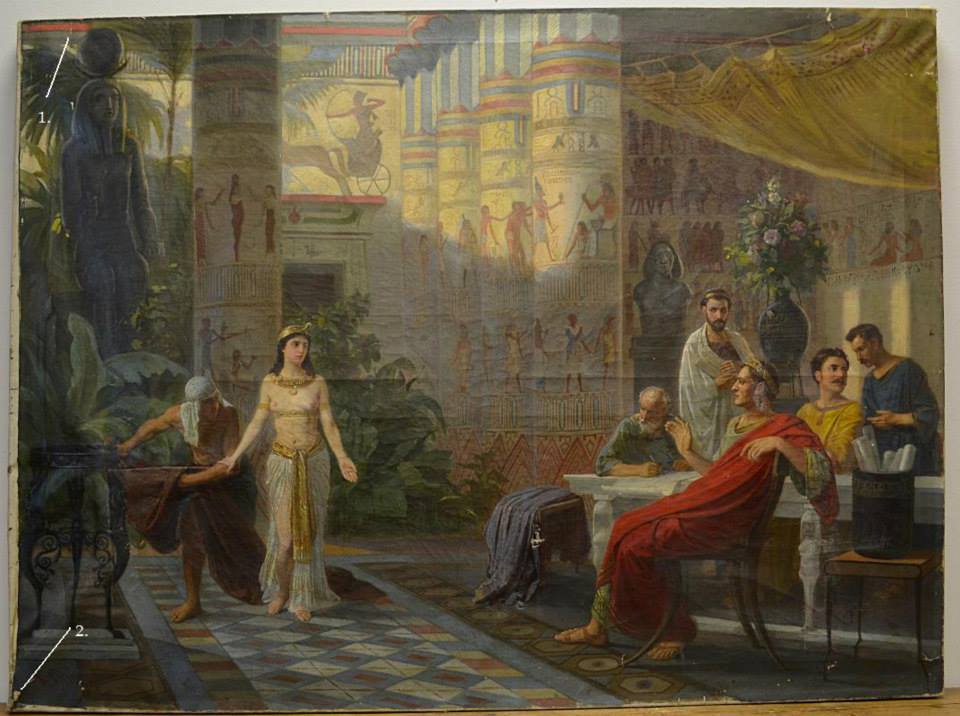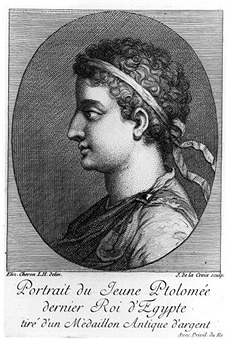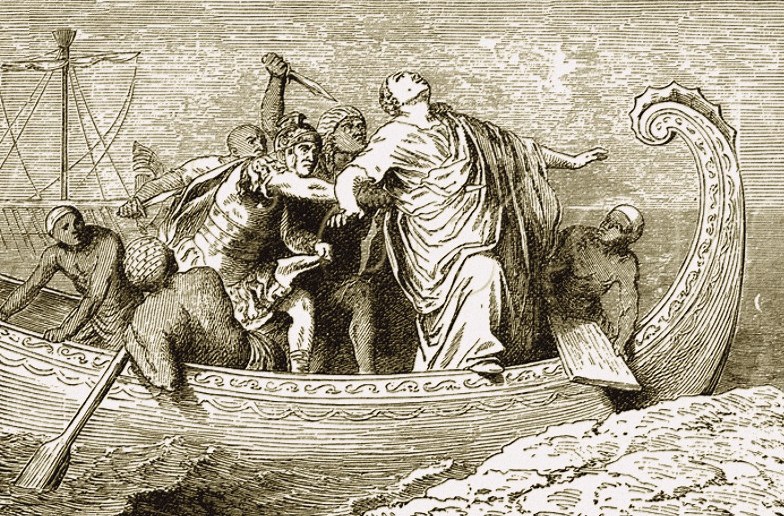|
Siege Of Alexandria (47 BC)
The siege of Alexandria was a series of skirmishes and battles occurring between the forces of Julius Caesar, Cleopatra VII, Arsinoe IV, and Ptolemy XIII, between 48 and 47 BC. During this time Caesar was engaged in a civil war against remaining Republican forces. The siege was lifted by relief forces arriving from Syria. After a battle contesting those forces' crossing of the Nile delta, Ptolemy XIII and Arsinoe's forces were defeated. Events Prelude After the Battle of Pharsalus, Pompey abandoned his defeated army and fled with his advisors overseas to Mytilene and then to Cilicia where he held a council of war. Pompey's council of war decided to flee to Egypt, which had in the previous year supplied him with military aid. His arrival in Egypt coincided with political tension between King Ptolemy XIII Theos Philopator and his sister Queen Cleopatra. After the death of their father, Ptolemy XII Auletes, the pair were decided to co-rule Egypt as was stated in Ptolemy ... [...More Info...] [...Related Items...] OR: [Wikipedia] [Google] [Baidu] |
Ptolemy XIII Theos Philopator
Ptolemy XIII Theos Philopator (, ''Ptolemaĩos''; c. 62 BC – 13 January 47 BC) was Pharaoh of Egypt from 51 to 47 BC, and one of the last members of the Ptolemaic dynasty (305–30 BC). He was the son of Ptolemy XII and the brother of and co-ruler with Cleopatra VII. Cleopatra's exit from Egypt caused a civil war to break out between the pharaohs. Ptolemy later ruled jointly with his other sister, Arsinoe IV. Biography Co-ruler of Egypt Son of the Egyptian Pharaoh Ptolemy XII (r. 80–58 BC and 55–51 BC), Ptolemy XIII succeeded his father as pharaoh of the Ptolemaic Kingdom in the spring of 51 BC at the age of 11. His father had stipulated that Ptolemy XIII would be married to his older sister Cleopatra (r. 51–30 BC), with the couple ruling as co-rulers. In October 50 BC, Ptolemy XIII was promoted to senior ruler along with her, although the eunuch Pothinus acted as regent for him. In the spring of 48 BC, Ptolemy XIII and Pothinus attempted to depose Cleopatra ... [...More Info...] [...Related Items...] OR: [Wikipedia] [Google] [Baidu] |
Battle Of The Nile (47 BC)
The Battle of the Nile in early 47 BC saw the combined Roman–Egyptian armies of Julius Caesar and Cleopatra VII defeat those of the rival Queen Arsinoe IV and King Ptolemy XIII and secure the throne of Egypt. Prelude After pursuing his rival Pompey to Egypt, Caesar, recently victorious in a civil war closer to home, became entwined in the Alexandrine civil war after his rival, Pompey Magnus, was killed by King Ptolemy XIII in an attempt to please Caesar. From September 48 BC until January 47 BC, Caesar was besieged in Alexandria, Egypt with about 4,000 men. He was attempting to resolve the Egyptian Civil War between Ptolemy XIII and his sister Cleopatra. When Caesar began to appear to favour Cleopatra over him, Ptolemy was first captured, but then released by Caesar, and gathered his army to besiege the Romans in a small area of Alexandria. By January, the Egyptians had begun to get the upper hand in their efforts to cut the Romans off from reinforcements and resup ... [...More Info...] [...Related Items...] OR: [Wikipedia] [Google] [Baidu] |
Roman Civil War
This list of Roman civil wars and revolts includes civil wars and organized civil disorder, revolts, and rebellions in ancient Rome (Roman Kingdom, Roman Republic, and Roman Empire) until the fall of the Western Roman Empire (753 BC – AD 476). For the Eastern Roman Empire or Byzantine Empire after the division of the Empire in West and East, see List of Byzantine revolts and civil wars (AD 330–1453). For external conflicts, see List of Roman external wars and battles. From the establishment of the Roman Republic in 509 BC until the 1st century BC, there were a sparse number of civil wars. But with the Crisis of the Roman Republic (134–44 BC), a period of considerable political instability began. The cause of the late Roman Republican civil wars is contested, as is whether the wars were the cause of, or caused by, the end of the Roman Republic. Regardless, a nearly constant stream of civil wars marked the end of the Roman Republic and heralded the rise of the Roman Empire ... [...More Info...] [...Related Items...] OR: [Wikipedia] [Google] [Baidu] |
Cassius Dio
Lucius Cassius Dio (), also known as Dio Cassius ( ), was a Roman historian and senator of maternal Greek origin. He published 80 volumes of the history of ancient Rome, beginning with the arrival of Aeneas in Italy. The volumes documented the subsequent founding of Rome (753 BC), the formation of the Republic (509 BC), and the creation of the Empire (27 BC) up until 229 AD, during the reign of Severus Alexander. Written in Koine Greek over 22 years, Dio's work covers approximately 1,000 years of history. Many of his books have survived intact, alongside summaries edited by later authors such as Xiphilinus, a Byzantine monk of the 11th century, and Zonaras, a Byzantine chronicler of the 12th century. Biography Lucius Cassius Dio was the son of Cassius Apronianus, a Roman senator and member of the Cassia gens, who was born and raised at Nicaea in Bithynia. Byzantine tradition maintains that Dio's mother was the daughter or sister of the Greek orator and philosopher, ... [...More Info...] [...Related Items...] OR: [Wikipedia] [Google] [Baidu] |
Plutarch
Plutarch (; , ''Ploútarchos'', ; – 120s) was a Greek Middle Platonist philosopher, historian, biographer, essayist, and priest at the Temple of Apollo (Delphi), Temple of Apollo in Delphi. He is known primarily for his ''Parallel Lives'', a series of biographies of illustrious Greeks and Romans, and ''Moralia'', a collection of essays and speeches. Upon becoming a Roman citizen, he was possibly named Lucius Mestrius Plutarchus (). Family Plutarch was born to a prominent family in the small town of Chaeronea, about east of Delphi, in the Greek region of Boeotia. His family was long established in the town; his father was named Autobulus and his grandfather was named Lamprias. His brothers, Timon and Lamprias, are frequently mentioned in his essays and dialogues, which speak of Timon in particular in the most affectionate terms. Studies and life Plutarch studied mathematics and philosophy in Athens under Ammonius of Athens, Ammonius from AD 66 to 67. He attended th ... [...More Info...] [...Related Items...] OR: [Wikipedia] [Google] [Baidu] |
La Mort De Pompée
''The Death of Pompey'' (''La Mort de Pompée'') is a tragedy by the French playwright Pierre Corneille on the death of Pompey the Great. It was first performed in 1642, with Julius Caesar played by Molière. Like many of Corneille's plays, it is noted for the high tones of its heroine, Cornelia, who admits that her enemy is noble and generous but warns him when he releases her that she will continue to seek his death.Louis Auchincloss, ''False Dawn'' p 4 In 1724 Colley Cibber wrote an English-language play ''Caesar in Egypt'' inspired by Corneille's original. It was staged at the Theatre Royal, Drury Lane with Barton Booth as Julius Caesar and Anne Oldfield Anne Oldfield (168323 October 1730) was an England, English actress and one of the highest paid actresses of her time. Early life and discovery She was born in London in 1683. Her father was a soldier, James Oldfield. Her mother was either Ann ... as Cleopatra. References 1642 plays Plays by Pierre Corneille ... [...More Info...] [...Related Items...] OR: [Wikipedia] [Google] [Baidu] |
Livy
Titus Livius (; 59 BC – AD 17), known in English as Livy ( ), was a Roman historian. He wrote a monumental history of Rome and the Roman people, titled , covering the period from the earliest legends of Rome before the traditional founding in 753 BC through the reign of Augustus in Livy's own lifetime. He was on good terms with members of the Julio-Claudian dynasty and was a friend of Augustus. Livy encouraged Augustus’s young grandnephew, the future emperor Claudius, to take up the writing of history. Life Livy was born in Patavium in northern Italy, now modern Padua, probably in 59 BC. At the time of his birth, his home city of Patavium was the second wealthiest on the Italian peninsula, and the largest in the province of Cisalpine Gaul (northern Italy). Cisalpine Gaul was merged into Italy proper during his lifetime and its inhabitants were given Roman citizenship by Julius Caesar. In his works, Livy often expressed his deep affection and pride for Patavium, and the ... [...More Info...] [...Related Items...] OR: [Wikipedia] [Google] [Baidu] |
Commentarii De Bello Civili
'' Commentarii de Bello Civili'' (''Commentaries on the Civil War''), or ''Bellum Civile'', is an account written by Julius Caesar of his war against Gnaeus Pompeius and the Roman Senate. It consists of three books covering the events of 49–48 BC, from shortly before Caesar's invasion of Italy to Pompey's defeat at the Battle of Pharsalus and flight to Egypt. It was preceded by the much longer account of Caesar's campaigns in Gaul and was followed by similar works covering the ensuing wars against the remnants of Pompey's armies in Egypt, North Africa, and Spain. Caesar's authorship of the ''Commentarii de Bello Civili'' is not disputed, while the three later works are believed to have been written by contemporaries of Caesar. Title The Latin title ''Commentarii de Bello Civili'' is often retained as the title of the book in English translations of the work. The title itself is Latin for "Commentaries on the Civil War". It is sometimes shortened to just "Civil Wars", "Abou ... [...More Info...] [...Related Items...] OR: [Wikipedia] [Google] [Baidu] |
Lucius Septimius
Lucius Septimius was a Roman soldier and mercenary who is principally remembered as one of the assassins of the triumvir Pompey the Great. At the time of the assassination in 48 BC, Septimius was serving the Ptolemies of Egypt as a mercenary. He was dispatched with orders to murder Pompey by Ptolemy XIII's advisors who wanted to win the favour of Julius Caesar for their king. Life Septimius had served under Pompey in his eastern campaign in the 60s BC, and he was in the army with which Aulus Gabinius restored Cleopatra's father Ptolemy XII Auletes to the throne in 55 BC. He had stayed in Egypt as part of a mercenary garrison, known as the Gabiniani, to support the king.Beryl Rawson, ''The Politics of Friendship: Pompey and Cicero'' Volume: 6. Sydney University Press. 1978, p.177 In ''Commentarii de Bello Civili'', Caesar refers to him as a "military tribune". Septimius was a leading figure among the Gabiniani. When Pompey fled to Egypt in 48 BC following his defeat by Julius ... [...More Info...] [...Related Items...] OR: [Wikipedia] [Google] [Baidu] |
Ptolemaic Egypt
Ptolemaic is the adjective formed from the name Ptolemy, and may refer to: Pertaining to the Ptolemaic dynasty * Ptolemaic dynasty, the Macedonian Greek dynasty that ruled Egypt founded in 305 BC by Ptolemy I Soter *Ptolemaic Kingdom Pertaining to a certain ancient writer *Relating to Ptolemy Claudius Ptolemy (; , ; ; – 160s/170s AD) was a Greco-Roman mathematician, astronomer, astrologer, geographer, and music theorist who wrote about a dozen scientific treatises, three of which were important to later Byzantine science, Byzant ..., 2nd-century AD geographer and astronomer/astrologer * Ptolemaic system, a geocentric model of the universe developed in detail by the astronomer Claudius Ptolemaeus See also * Ptolemy (name) {{disambig ... [...More Info...] [...Related Items...] OR: [Wikipedia] [Google] [Baidu] |
Theodotus Of Chios
Theodotus of Chios () (died in 43 or 42 BC) was the rhetoric tutor of the young Egyptian king Ptolemy XIII. Biography Theodotus of Chios was a trained rhetorician and the tutor of Ptolemy XIII. He was one of the three influential men who led the guardianship for the young Egyptian king after the death of Ptolemy XII (spring of 51 BC). The most powerful of these men was the eunuch and minister Pothinus, the second in rank was the commander-in-chief Achillas and finally in third place was Theodotus. In autumn of 50, these three guardians succeeded in securing Ptolemy XIII the participation in the rule of Egypt together with his ambitious older sister Cleopatra VII who in the first year of her accession to the throne (spring of 51) had been able to rule alone. At the end of 49, Pothinus and his comrades expelled the Queen from Egypt. Ptolemy XIII became the sole ruler but was still under the influence of his three guardians. The dethroned queen soon organized her own army b ... [...More Info...] [...Related Items...] OR: [Wikipedia] [Google] [Baidu] |
Eunuch (court Official)
A eunuch ( , ) is a male who has been castration, castrated. Throughout history, castration often served a specific social function. The earliest records for intentional castration to produce eunuchs are from the Sumerian city of Lagash in the 2nd millennium BCE. Over the millennia since, they have performed a wide variety of functions in many different cultures: courtiers or equivalent Domestic worker, domestics, for espionage or clandestine operations, ''castrato'' singers, Concubinage, concubines or sexual partners, religious specialists, soldiers, royal guards, government officials, and guardians of women or harem servants. Eunuchs would usually be servants or Slavery, slaves who had been castrated to make them less threatening servants of a royal court where physical access to the ruler could wield great influence. Seemingly lowly domestic functions—such as making the ruler's bed, bathing him, cutting his hair, carrying him in his litter (vehicle), litter, or even rel ... [...More Info...] [...Related Items...] OR: [Wikipedia] [Google] [Baidu] |






